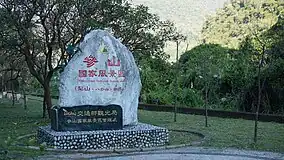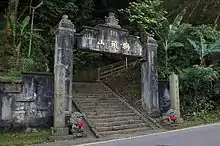| Tri-Mountain National Scenic Area | |
|---|---|
| 參山國家風景區 | |
 | |
| Location | Central Taiwan |
| Coordinates | 24°03′30″N 120°41′54″E / 24.058342°N 120.698406°E |
| Area | 77,521 ha (299.31 sq mi)[1] |
| Designation | National scenic area |
| Created | 16 March 2001 |
| Administrator | Tourism Bureau |
| Website | Official website |
Tri-Mountain National Scenic Area (Chinese: 參山國家風景區; pinyin: Sānshān Guójiā Fēngjǐngqū) is a national scenic area located within central Taiwan, spanning Hsinchu County, Miaoli County, Taichung City, Changhua County, and Nantou County. The area is composed of three non-contiguous scenic areas (Baguashan, Shitoushan, and Lishan), which are all named after mountains, hence the name.
The three scenic areas were formerly distinct and designated as province-level scenic areas. With the deprecation of the Taiwan Provincial Government, the areas were merged into one for easier management on 16 March 2001. The management office is located outside of the scenic area in Wufeng District, Taichung.[1]
Baguashan
Baguashan (Chinese: 八卦山; pinyin: Bāguàshān) is located within Changhua County and Nantou County and encompasses the entire Bagua Plateau. The scenic area is most known for its 26 m tall Buddha statue and a nearby skywalk.[2] The plateau is also known for producing pineapple, turmeric, dragon fruit, and tea.[3][4] The area also contains Shoutian Temple, a popular temple dedicated to Xuantian Shangdi.[5]
Shitoushan

Shitoushan (Chinese: 獅頭山; pinyin: Shītóushān; lit. 'lion head mountain') is located in Hsinchu County and Miaoli County. The scenic area's namesake is known for its many Buddhist and Daoist temples that are built into cliffs. A 5 km historic hiking trail known as the Shishan Path (獅山古道) connects the eleven temples.[6] Also within the area is Nanzhuang Old Street, a Hakka settlement in Miaoli and tourist attraction.[7] The scenic area is also home to the Atayal people and Saisiyat people.[8]
Lishan
Lishan (Chinese: 梨山; pinyin: Líshān) is located entirely within Heping District, Taichung. The area is historically inhabited by the Atayal people and is known for its high-altitude agricultural products, notably peaches, Asian pears, apples, and various vegetables.[9][10] Guguan, a hot spring town, is also located within the scenic area.
See also
References
- 1 2 "機關介紹". Tourism Bureau (in Chinese (Taiwan)). 6 August 2018. Retrieved 23 June 2020.
- ↑ Chang, Tsung-chiu (11 July 2016). "Skywalk opened to bolster Baguashan". Taipei Times. Retrieved 23 June 2020.
- ↑ 賴香珊 (17 May 2020). "蒼蠅大軍壓境南投 環保局祭滅飛計畫要「打蠅」" (in Chinese (Taiwan)). United Daily News. Retrieved 23 June 2020.
- ↑ 彭杏珠 (7 November 2018). "每年供應4000噸基底茶 松柏嶺四季春迎來第二春". Anue (in Chinese (Taiwan)). 遠見雜誌. Retrieved 23 June 2020.
- ↑ 謝介裕 (7 March 2017). "信眾住宿卡位戰!松柏嶺受天宮預約排到1年後…" (in Chinese (Taiwan)). Liberty Times. Retrieved 24 November 2020.
- ↑ 廖雪茹 (18 September 2019). "獅山原廟群文資調查 竹縣爭獅尾列入" (in Chinese (Taiwan)). Liberty Times. Retrieved 23 June 2020.
- ↑ "客庄巡禮前進南庄!走訪景點、品嘗客家私房菜" (in Chinese (Taiwan)). FTV News. 1 June 2020. Retrieved 23 June 2020.
- ↑ 張勳騰 (22 June 2020). "南庄增設2原民文健站 7.1開站" (in Chinese (Taiwan)). Liberty Times. Retrieved 23 June 2020.
- ↑ "梨山風景區". Taichung Travel Net (in Chinese (Taiwan)). Taichung City Government. 29 November 2018. Retrieved 23 June 2020.
- ↑ 達少歐嗨 (27 July 2016). "Kmlayan大梨山泰雅祖先 血緣分支各地". Indigenous Peoples Cultural Foundation (in Chinese (Taiwan)). Retrieved 23 June 2020.